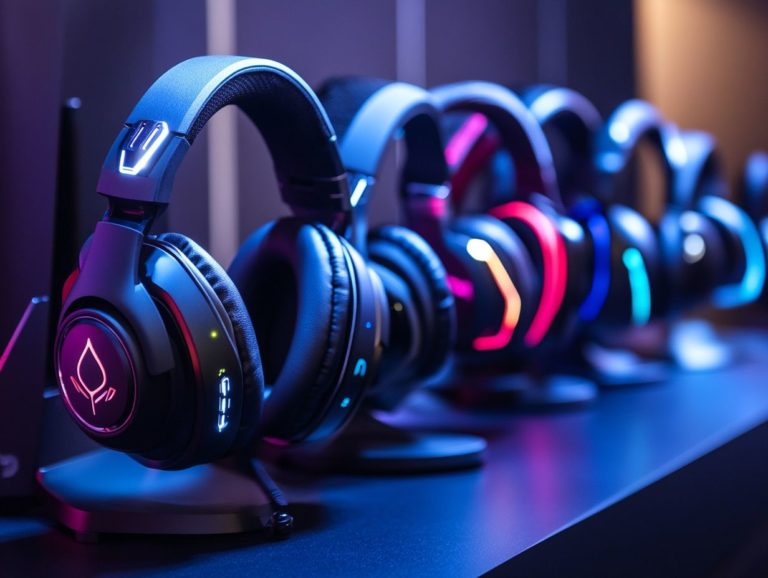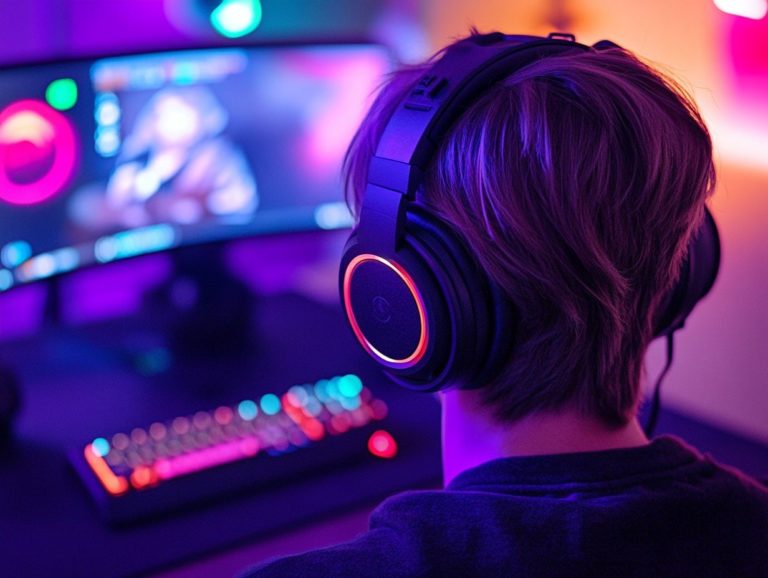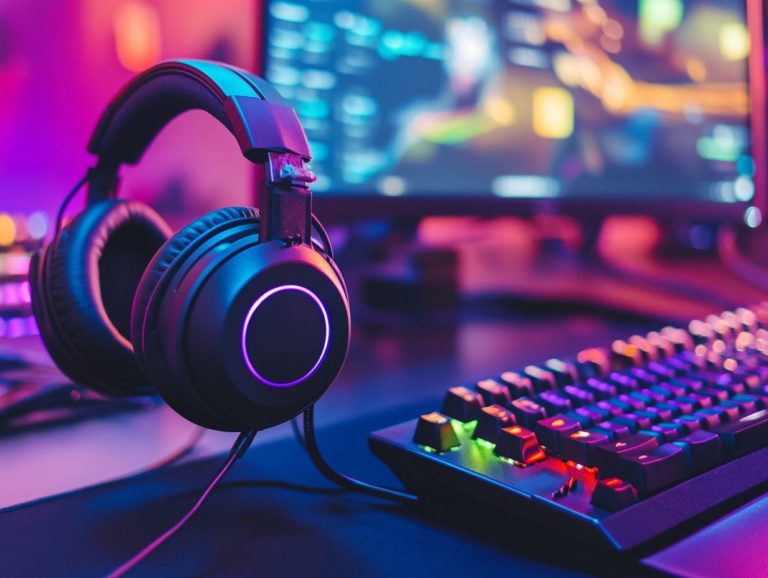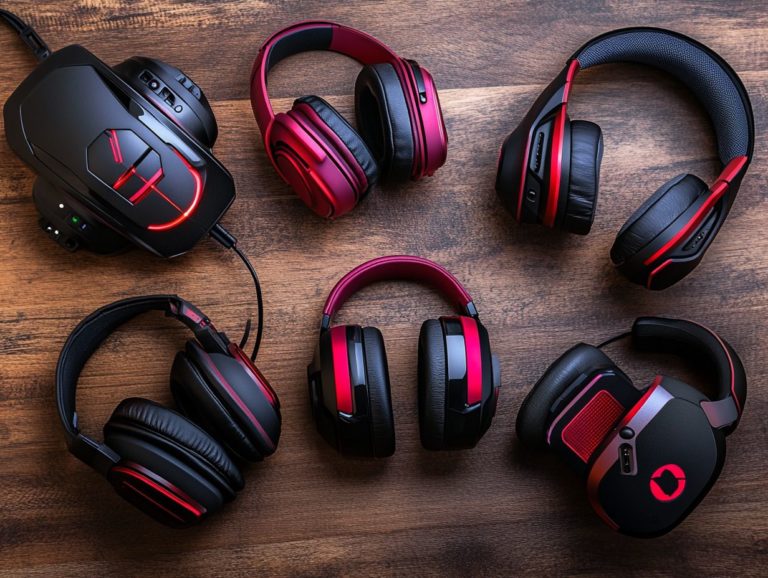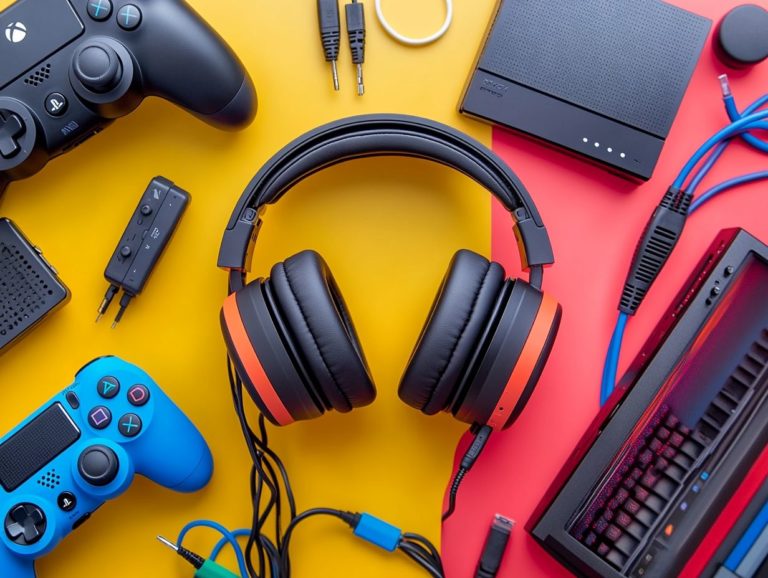understanding audio latency in gaming headsets
Audio latency is the delay you experience between hearing a sound and when it actually occurs. This delay can greatly influence your gaming experience, especially for competitive players who rely on quick sound cues for immersion and strategy.
In this article, you ll explore audio latency, its impact on gameplay, and the factors that contribute to delays in gaming headsets.
You ll learn how to measure latency, find practical tips for reducing it, and identify essential features to look for when selecting a headset.
Whether you re a casual gamer or a competitive player, understanding audio latency is vital for enhancing your gaming experience.
Contents
- Key Takeaways:
- What is Audio Latency?
- The Impact of Audio Latency on Gaming
- Conclusion
- Causes of Audio Latency in Gaming Headsets
- How to Measure and Test Audio Latency
- Reducing Audio Latency in Gaming Headsets
- Choosing the Right Gaming Headset for Low Latency
- Frequently Asked Questions
- What is audio latency in gaming headsets?
- How does audio latency affect the gaming experience?
- What causes audio latency in gaming headsets?
- How can I reduce audio latency in my gaming headset?
- Are all gaming headsets affected by audio latency?
- Is there a way to test the audio latency on my gaming headset?
Key Takeaways:
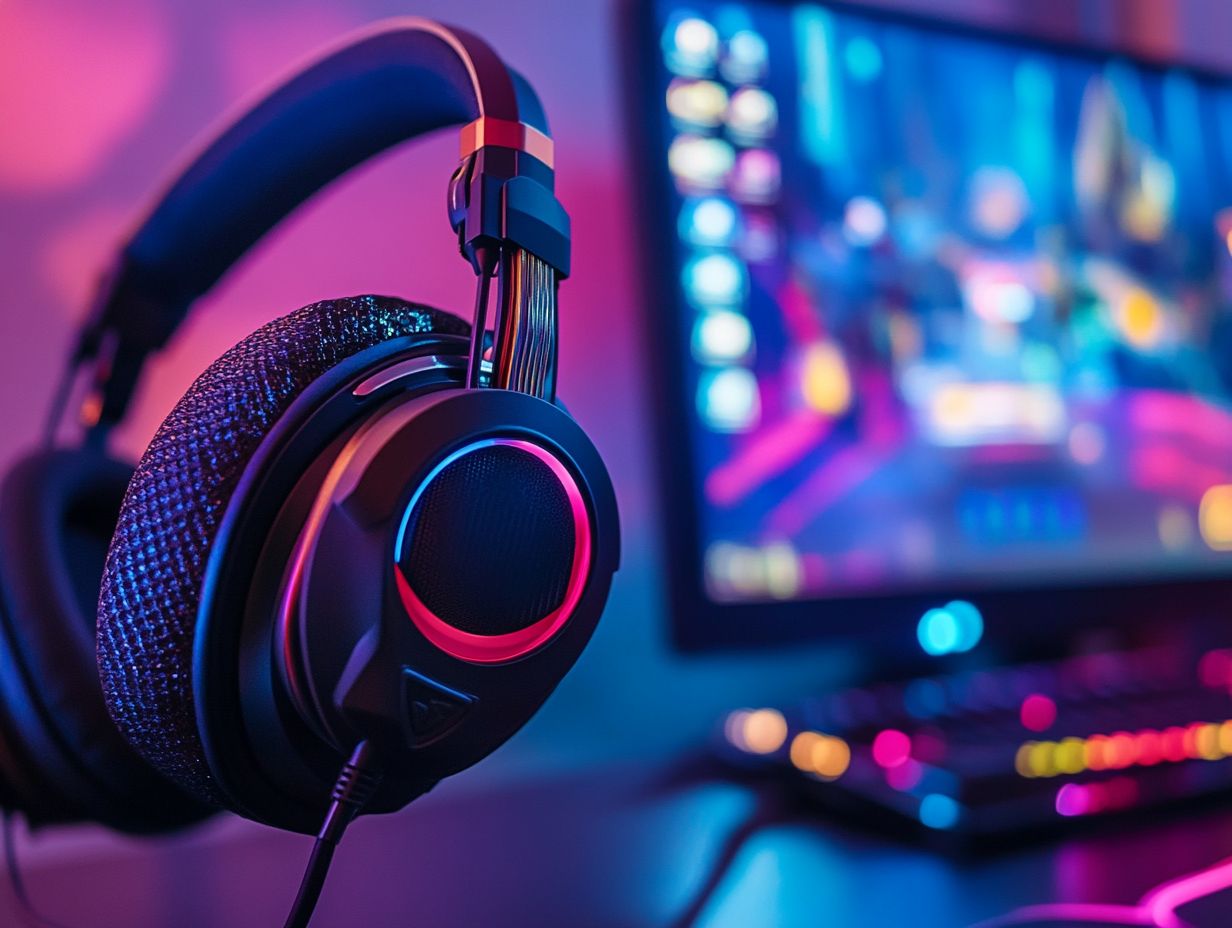
- Audio latency is the time delay between a sound being produced and being heard.
- It can significantly impact gaming performance.
- Factors such as hardware and software can contribute to audio latency.
- Regularly measuring and testing latency is important for optimization.
- To reduce audio latency, consider features like low latency modes, wired connections, and high-quality audio codecs.
- Choose a headset specifically designed for gaming.
What is Audio Latency?
Audio latency refers to the time it takes for sound to travel from the source to your headset. It is usually measured in milliseconds. This measurement is crucial for making sure that audio aligns with visual elements, especially in fast-paced games.
Several factors can affect audio latency. For example, whether you re using a wired or wireless connection can make a difference. The hardware of your gaming console or PC also plays a role, impacting overall latency.
Understanding these factors is essential for achieving an immersive gaming experience. Even the smallest delay can disrupt your timing and hinder your performance during critical moments.
The Impact of Audio Latency on Gaming
Audio latency can significantly affect your gaming experience, especially for competitive players who depend on precise sound cues to make quick decisions.
High audio latency can lead to input lag, creating a mismatch between what you see on-screen and the sounds you hear. This disconnect can greatly reduce your performance and immersion.
In fast-paced games, where every sound cue matters, any latency can mean missed opportunities. Therefore, having the right headphone specifications is essential for maintaining your competitive edge.
How it Affects Gameplay and Performance
Audio latency can introduce frustrating delays that hinder your ability to react swiftly in games.
This delay is particularly detrimental in genres like first-person shooters, where split-second decisions can determine victory or defeat.
In role-playing games, latency can disrupt the immersive experience, making it hard to synchronize sound cues with your actions.
To evaluate headset performance effectively, use rigorous testing methods, such as controlled trials, real-time audio-output monitoring, and user experience surveys.
Advanced noise cancellation technology can help mitigate these issues by filtering out distracting background sounds, allowing you to focus on in-game audio cues and improve your responsiveness.
Conclusion
Understanding audio latency is essential for anyone looking to enhance their gaming experience. By measuring and minimizing latency, you can achieve optimal audio performance, ensuring that every sound cue is perfectly timed with your gameplay.
Consider trying out different headsets and features to find what works best for you. Measure your own headset latency and enjoy your games to the fullest!
Causes of Audio Latency in Gaming Headsets
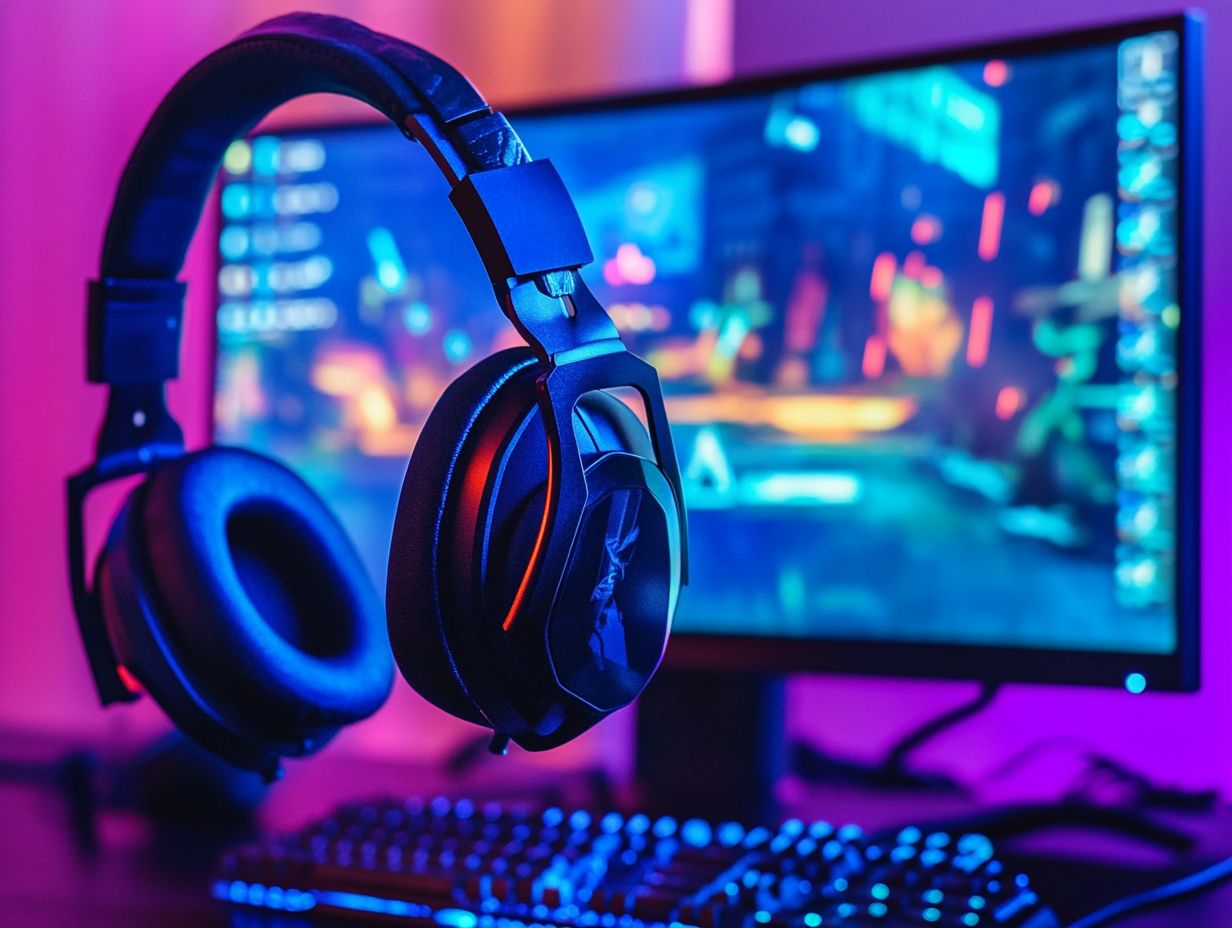
Audio latency in gaming headsets can stem from a variety of hardware and software factors, potentially impacting your overall gaming experience. Similarly, understanding mouse latency in gaming is crucial for optimal audio performance.
The choice of Bluetooth technology and its version is particularly significant, as older versions often introduce higher latency compared to modern codecs like aptX Low Latency.
Sound processing algorithms and the quality of audio formats in your gaming headphones can increase latency issues, influencing the efficiency of audio transmission.
Hardware and Software Factors
Both hardware and software factors are essential in shaping the audio latency you experience with gaming headsets.
The quality of your Bluetooth driver is pivotal for seamless communication between your headset and gaming device; a high-performance driver can significantly minimize lag.
The audio source matters too; a more robust sound card or integrated audio solution can boost processing speed, further cutting down on latency.
On the software front, various gaming modes can influence audio performance. Certain settings are designed to prioritize quick response times for competitive play.
By making these adjustments, you ll optimize sound processing, reducing the chances of delay and ensuring that you enjoy a more immersive experience without interruptions.
How to Measure and Test Audio Latency
Measuring and testing audio latency is crucial for evaluating the performance of gaming headsets. This ensures they align with the rigorous demands of today’s competitive gaming landscape.
You can utilize various tools and techniques to accurately assess audio latency, including specialized software designed to measure the time delay between audio output and input.
Performance testing may also encompass real-time gameplay scenarios. This allows you to observe firsthand how latency influences your overall gaming experience and sound immersion.
Tools and Techniques for Evaluation
You have a variety of tools and techniques at your disposal for evaluating audio latency in gaming headsets. Latency measurement applications and specialized audio equipment enable you to assess the time it takes for sound to travel from the source to your ears.
Understanding the role of audio formats is equally essential, as certain formats can significantly reduce latency, ultimately enhancing your gaming experience.
By conducting performance testing, you can discover which headset not only delivers superior sound quality but also minimizes delays. This ensures that every action aligns seamlessly with in-game events, which is crucial for gamers like you striving for a competitive edge.
Reducing Audio Latency in Gaming Headsets
Reducing audio latency in gaming headsets is essential for elevating your gaming experience and securing that competitive edge.
Try these simple tips to reduce latency and boost your gaming experience!
Embracing modern Bluetooth technology, particularly features like Auto Low Latency Mode, can dramatically decrease audio processing delays. This ensures clearer sound transmission during gameplay, allowing you to catch those crucial sound cues right when you need them.
Tips and Tricks for Minimizing Latency
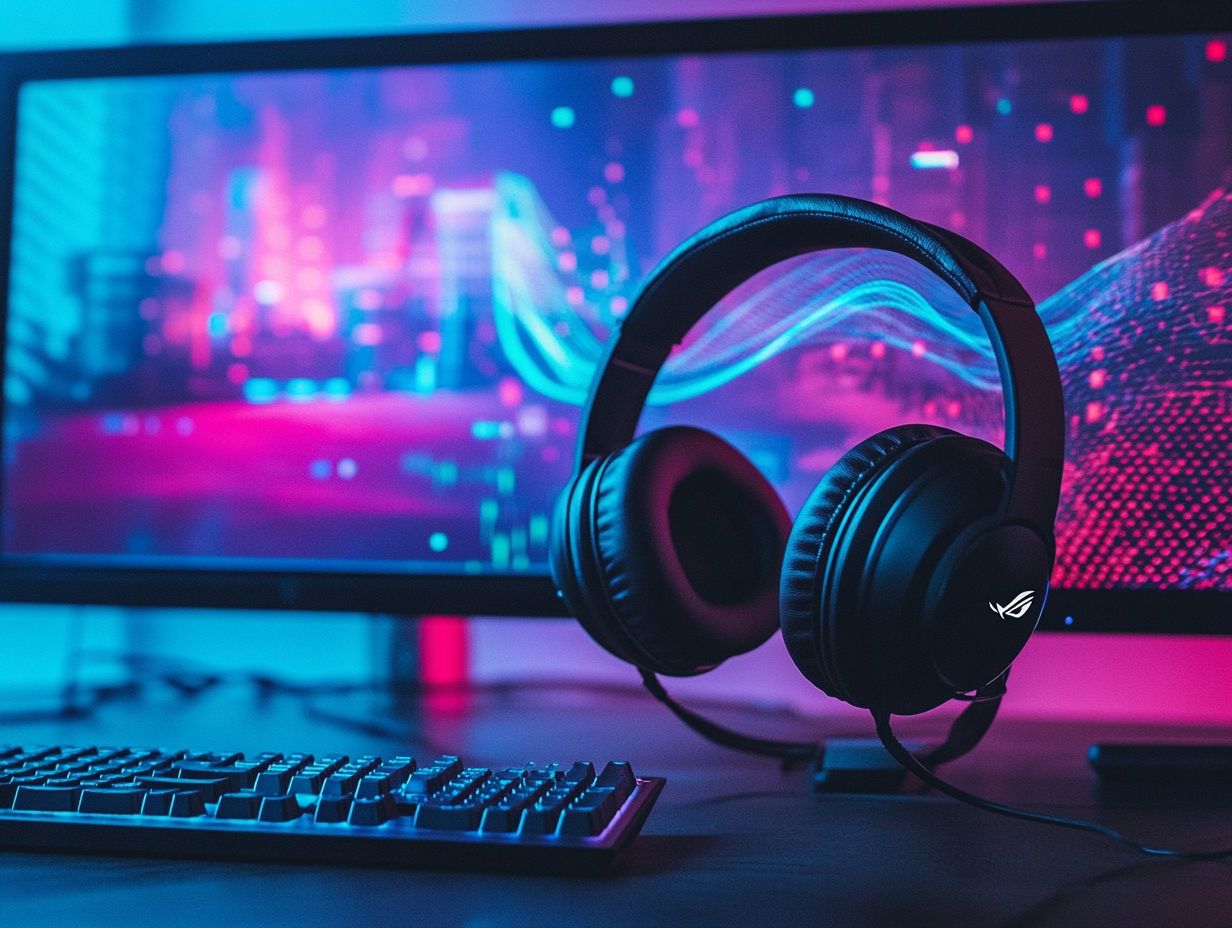
There are several tips and tricks you can employ to minimize audio latency when using gaming headphones, especially if you re aiming for peak performance in competitive gaming.
By optimizing your wireless connections, you can significantly elevate your audio experience. Choosing high-quality Bluetooth headphones is essential, as some models are specifically engineered with low-latency technology.
Utilizing performance testing tools allows you to pinpoint any delays in sound response. This enables you to make necessary adjustments before plunging into intense gaming sessions.
It’s also wise to keep your headphones firmly within range of the console. This helps prevent interruptions and ensures a seamless connection.
By incorporating these practical steps, you can achieve a more immersive and responsive gaming experience.
Choosing the Right Gaming Headset for Low Latency
Selecting a gaming headset with low latency is crucial for an ultimate gaming experience. This is especially true for competitive gamers who rely on precise audio feedback.
When choosing your gaming headset, consider various specifications, such as Bluetooth technology, audio formats, and overall sound quality.
These elements directly impact audio performance and can significantly enhance latency reduction, making all the difference in your gameplay.
Features to Look for and Considerations
When selecting a gaming headset, thoughtfully consider several features to ensure optimal audio performance and minimal latency.
Effective noise cancellation is essential. It minimizes distractions, allowing you to immerse fully in the game.
Advanced sound processing technologies can enhance audio clarity. This enables you to detect subtle in-game sounds that give you the competitive edge you need.
Low-latency audio transmission is vital, as it eliminates delays and ensures your actions are perfectly synchronized with the game s audio cues.
For serious gamers, choosing a headset with customizable equalizers can elevate your play! This allows you to tailor the sound profile to fit the specific demands of various gaming genres, ultimately boosting your overall performance.
Frequently Asked Questions
What is audio latency in gaming headsets?
Audio latency in gaming headsets refers to the delay between when a sound is produced and when it is heard through the headset. It can be caused by various factors such as processing time, wireless transmission, or hardware limitations.
How does audio latency affect the gaming experience?
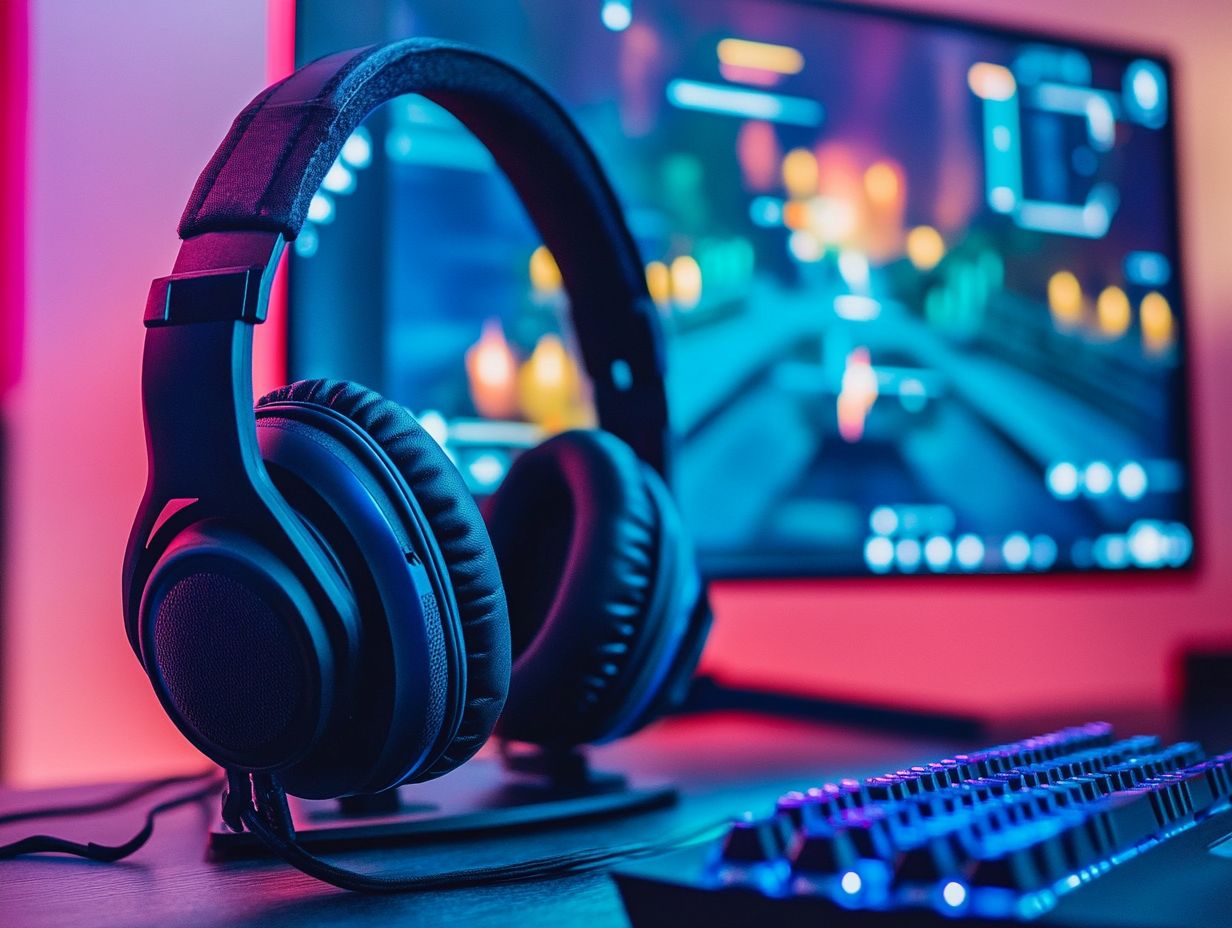
Audio latency can significantly impact the gaming experience by causing delays in sound effects. This makes it difficult to react quickly in fast-paced games. It can also result in audio being out of sync with video, which can be very distracting.
What causes audio latency in gaming headsets?
Audio latency can be caused by various factors, including the type of connection (wired or wireless), the quality of the headset’s hardware and software, the processing power of the device, and the distance between the headset and the sound source.
How can I reduce audio latency in my gaming headset?
There are several ways to reduce audio latency. These include using a wired connection, choosing a high-quality headset with low-latency technology, and adjusting the audio settings on your device to prioritize performance over sound quality.
Are all gaming headsets affected by audio latency?
Not all gaming headsets are affected by audio latency in the same way. Some headsets are designed with low-latency technology and have faster processing times, resulting in minimal audio delay. It is essential to research and choose a headset specifically designed for gaming to minimize audio latency.
Is there a way to test the audio latency on my gaming headset?
Yes, various free online tools can help you test the audio latency on your gaming headset. These tools generate a sound and measure the time it takes for the sound to reach your headset, giving you an idea of the audio latency. However, keep in mind that these tests may not be 100% accurate and can vary depending on your internet connection and device performance.

